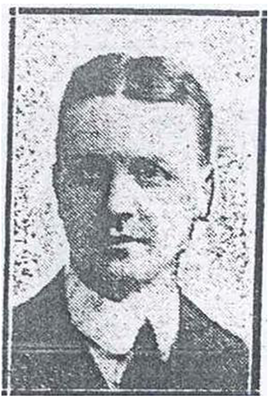19th July - No letter
Secret diary: No entry
Official diary (19th July): No entry
Location: Waterpark House, Hartigan’s near Castleconnell
Nothing of note appeared to have happened on the 19th July. The day before and day after there were ‘poaching expeditions’, possibly there was more of the same on the Monday. The general’s captors were certainly being ‘solicitous’ about his welfare and enjoyment of his time with them. By this time those guarding him had become more relaxed and he’d had some very interesting conversations with them.
Guests of the Nation
My thanks to Sean O Donnell (Ardee, Co Louth), who wrote a letter to the Irish Times and mentioned the Guests of the Nation short story.
Frank O'Connor (born Michael Francis O'Donovan; 17 September 1903 – 10 March 1966) was a former member of the IRA and was based in Cork during the War of Independence. He later became a writer and ended up teaching at Stanford University. One of his best known short stories is "Guests of the Nation" which was first published in 1931. It tells the tale of two Englishmen held captive by the IRA during the War for Independence. There are lots of similarities to the capture of General Lucas, the two men get on well with their guards, playing cards and drinking whiskey. They build up a friendship with the Irish lady who looks after them and she in turn grows fond of them. The story ends with the guards being told that these men are not prisoners but hostages and if Irish prisoners are executed then they will be too.
The inevitable happens - IRA men are executed and so the two English soldiers are executed too. Read the whole story here: https://www.csus.edu/indiv/m/maddendw/The-Oxford-Book-of-Short-Stories_29GuestsoftheNation.pdf
It is particularly chilling when one realises just how close CHTL came to sharing this same fate. Sadly other men held prisoners by the IRA did lose their lives in retaliation for the killing of IRA men. Below are two tragic stories which are not fictional but heart-rending fact.
The fate of other prisoners
Inspector Potter
Eight months after CHTL escaped, the 3rd Tipperary Brigade captured D.I Potter in Co. Tipperary. Gilbert Norman Potter, (10 July 1887 - 27 April 1921), was a District Inspector of the Royal Irish Constabulary. He was stationed at Cahir, County Tipperary and his son Charles was told that 'many people in the Cahir area across the political spectrum had held his father in the highest regard as a kindly and honourable man, notwithstanding his participation on the 'wrong side' of the war.' (Goulden Papers Tom O'Connor to Dan Breen 30th September 1966, Goulden Papers, 7382a/196, Gilbert Charles Potter to J.R.W. Goulden, 14 Nov. 1967)

In April 1921 Inspector Potter was captured, held prisoner for a while and then executed by the Irish Republican Army in reprisal for the British execution of one of their men. Potter was well-treated - as was CHTL - and some very heart-rending letters to his wife survive along with his diary.
5th Day of Captivity --- With I.R.A.. 26th April 1921
Dear Bishop,
I hope you can do something to help Lily in this time of distress for her. I have written her a letter and she may have received it as the IRA officer told me it was posted ---Pals in Ireland have regard for my wife who is Irish more so than I am, as regards her family having held land in the country ---I cannot now write my personal feelings to you --- [ Illeg. ] --- The I.R.A treat me well and are kind hearted --- comfort my dear Lily. How awful that I should have brought her this trouble ---If you see Lily soon tell her that her goodness to me and devoted love are felt by me and are a treasure in my affliction ---I pray for her and the prayers are heard.
Yours affect’ly, Gilbert.
27 April 1921
Dearest Wife I hope you had news of me through my letter ---The IRA say you can send me a parcel if you take steps that the method of sending it is not known & kept secret ---Perhaps you could give a parcel to Mrs, Cleary which she could keep at Spelmans[?] until it is called for. I want ---
(1) Clean long drawers (2) Clean long cotton vest (3) Clean cotton shirt (4) pair socks (5) big boots [Illeg ] inside with insoles --- the K would suit best (6) Waterproof coat (7) Safety razor with two dozen new blades (8) Shaving brush, soap, a small sponge (9) Tooth brush
If you put the lot in cloth haversack like the RIC have I could carry it --- If impossible to send don’t be troubled as the people I meet are really kind and could supply everything except a safety razor --- Now darling wife God will help us. My love to you Hilda, Georgie, Charles and Freddie --- Could you send me a pound?
Your husband, Gilbert
27 April 1921
I request those in authority with IRA to send to my wife my note book which contains messages for her and my will. There are, I am sure, humane leaders who will pity a wife who is Irish, as I am also. G.N. Potter
Enclosed in box for my wife
Wrist watch Gold ring Cigarette holder Silver match box Set of keys Cigarette case Letter for her and the Bishop of Waterford.
Dan Green, who was one of the IRA volunteers who carried out Potters execution wrote:
Potter was in our reckoning not a British soldier but a nice traitor. We informed him that he was to be executed. We gave him every facility for communicating with his wife and children. You was reputed to be a very wealthy man and tried to bribe his guards by offering a substantial sum for his release. They probably reported the matter to me.
I was very distressed at having to carry out such an unpleasant duty. We had considered the matter most carefully and concluded that we had no alternative. Potter was a kind and cultured gentleman and a brave officer. Before he was executed on 27 April he handed over a diary, a Signet ring and gold watch with the request that we should convey them to his wife. We fulfilled his request.
The difference in tone between Potter’s and CHTL’s letters is startling. CHTL’s letters were totally positive, he was convinced that he would eventually be released, he was not a victim but exercised some influence on those who held him. he had developed good relationships to the extent that his captors became in a strange sense ‘pals’ - not ‘foes’. Potter on the other hand appeared to resigned himself to his fate. He prepared himself and his wife for his death, CHTL had been constantly preparing Poppy with a future life together. Potter was well treated as with CHTL and yet Potter was executed and CHTL survived. https://en.wikipedia.org/wiki/Gilbert_Potter
Major Crompton Smith D.S.O
Major Crompton Smith D.S.O. (Royal Welsh Fusiliers), was also executed the day after Potter’s death, following the execution of IRA men by the British. Even the IRA described Crompton Smith’s good qualities “a man of admirable and a estimable character who had done nothing unworthy against us. Unfortunately in these dreadful times this generous and kindly gentleman had to suffer for the atrocities of the Forces of the Crown.”
Crompton Smith was the commander of the British Army base at Ballyvonane, near Buttevant. He was also an intelligence officer. His weakness was not fishing but meeting with a nurse with whom he was having an affair. It was on a trip to meet her that he was captured. Perhaps his guilt over the affair partly influenced his acceptance of his fate?
Crompton Smith’s last letter to his wife shows incredible dignity and just what an honourable man he was as he faced death:
“I am to be shot in hours time. Dearest, your husband will die with your name on his lips, your face before his eyes, and he would die like an Englishman and soldier. I leave my cigarette case to the regiment, my medals to my father, and my watch to the officer who is to execute me, because I believe him to be a gentleman and to mark the fact that I bear him no malice carrying out what you sincerely believes to be his duty.”
A second letter was addressed to his regiment, and in it he says:
“I should like my death to lessen rather than increase the bitterness which exists between England and Ireland … My cigarette case I leave to the mess. I … shall die with it in my pocket.”
Compton-Smith’s final letter was to Lt.-Gen. Strickland. It is from a major to his most senior officer, but it shows very little respect for the latter. He starts off by admitting that he had disobeyed orders. He doesn’t condemn the IRA but actually calls them idealists ‘who are doing what they earnestly believe to be right’.
After finishing his letters, Compton-Smith was led up into Barrahaurin bog behind Moynihan’s house, to a place where his grave had already been dug, and was given a final cigarette. In his witness statement Maurice Brew wrote: ‘When removed to the place of execution he placed his cigarette case in his breast pocket of his tunic … He then lighted a cigarette and said that when he dropped the cigarette it could be taken as a signal by the execution squad to open fire.
Major Crompton Smith’s story is very interesting, and worth reading more about. His story is possibly more likely to have been the story that most influenced Frank O'Connor writing “Guests of the Nation”. The Major’s body was found in a bog which was where the two English soldiers in the story are buried.
Saoirse Ní Shiocháin is a student in Gaelcholáiste Choilm, Baile an Chollaigh, Co. Corchaí, who wrote a detailed description of the Major Crompton Smith story, concluded her account with the folowing:
"The story of Compton-Smith’s capture and death is a story of Ireland’s War of Independence, a story of love, of respect between enemies, and of the death of a brave man in a lonely bog. Compton-Smith was a British officer and a war hero, and I was surprised to learn that he had some sympathy for Sinn Féin and its aims. It is amazing to hear of his joining in the singing of a rebel song in a kitchen in the Boggeragh Mountains. His bravery on the day of his death is inspiring. His act of forgiveness in giving his watch to the local IRA leader, Jackie O’Leary, was very moving. His letters to his wife are full of love, even if he might have been having an affair’."
What happened to Potter and Crompton Smith makes one realise just how close CHTL came to losing his life.The mood rapidly changed after CHTL escaped and some of the kindness was lost in the bitterness of war. The capture of General Lucas during the Irish War of Independence was a unique moment with humanity triumphing over the desire for retaliation.
These stories must be placed in the perspective of the many Irish men and some women that lost their lives during this period. The grief and heart-ache felt by English families were also felt by Irish families. It is horrendous that politicians couldn’t have found a solution decades beforehand, so many lives could have been saved and so many children saved the pain and poverty caused by growing up without their fathers.

